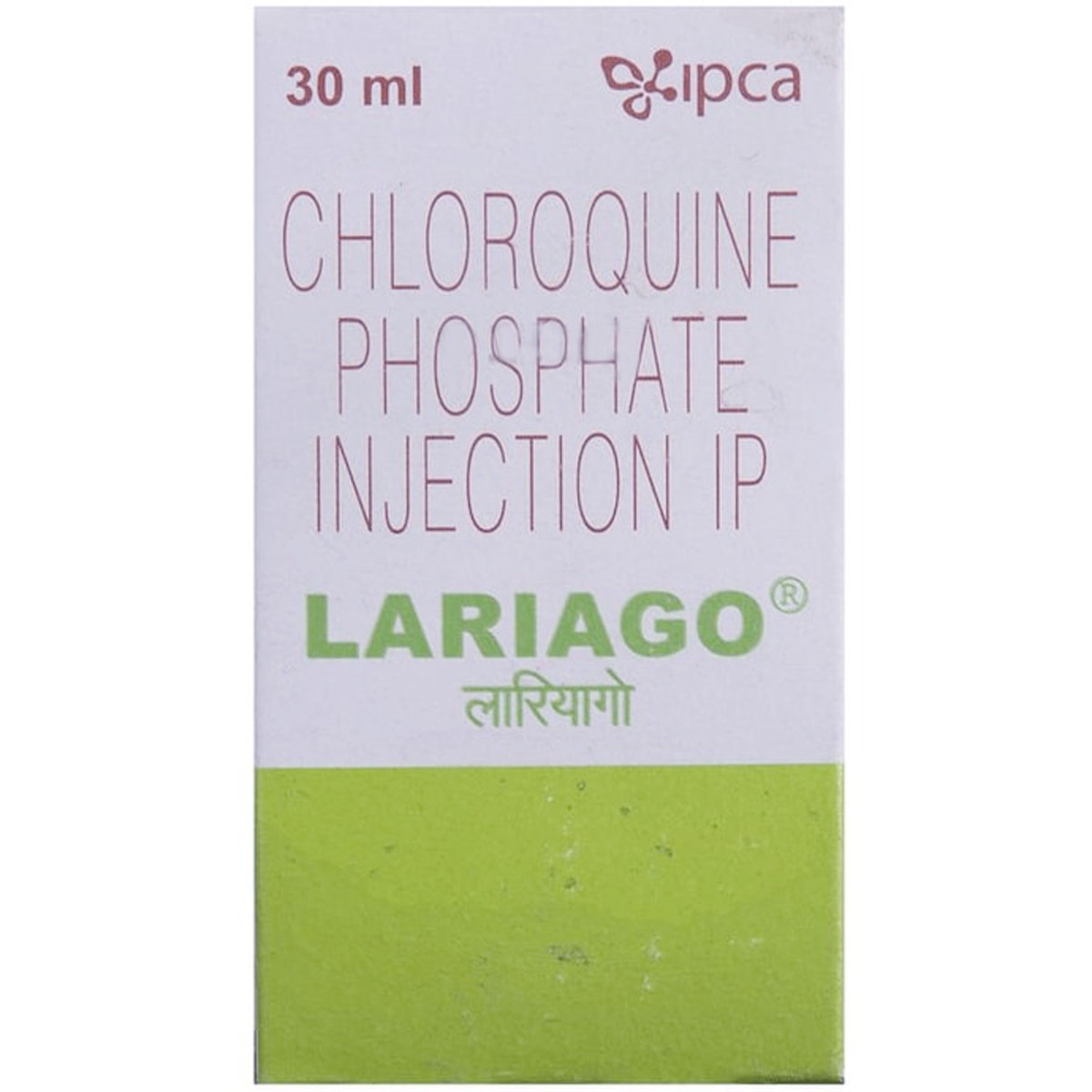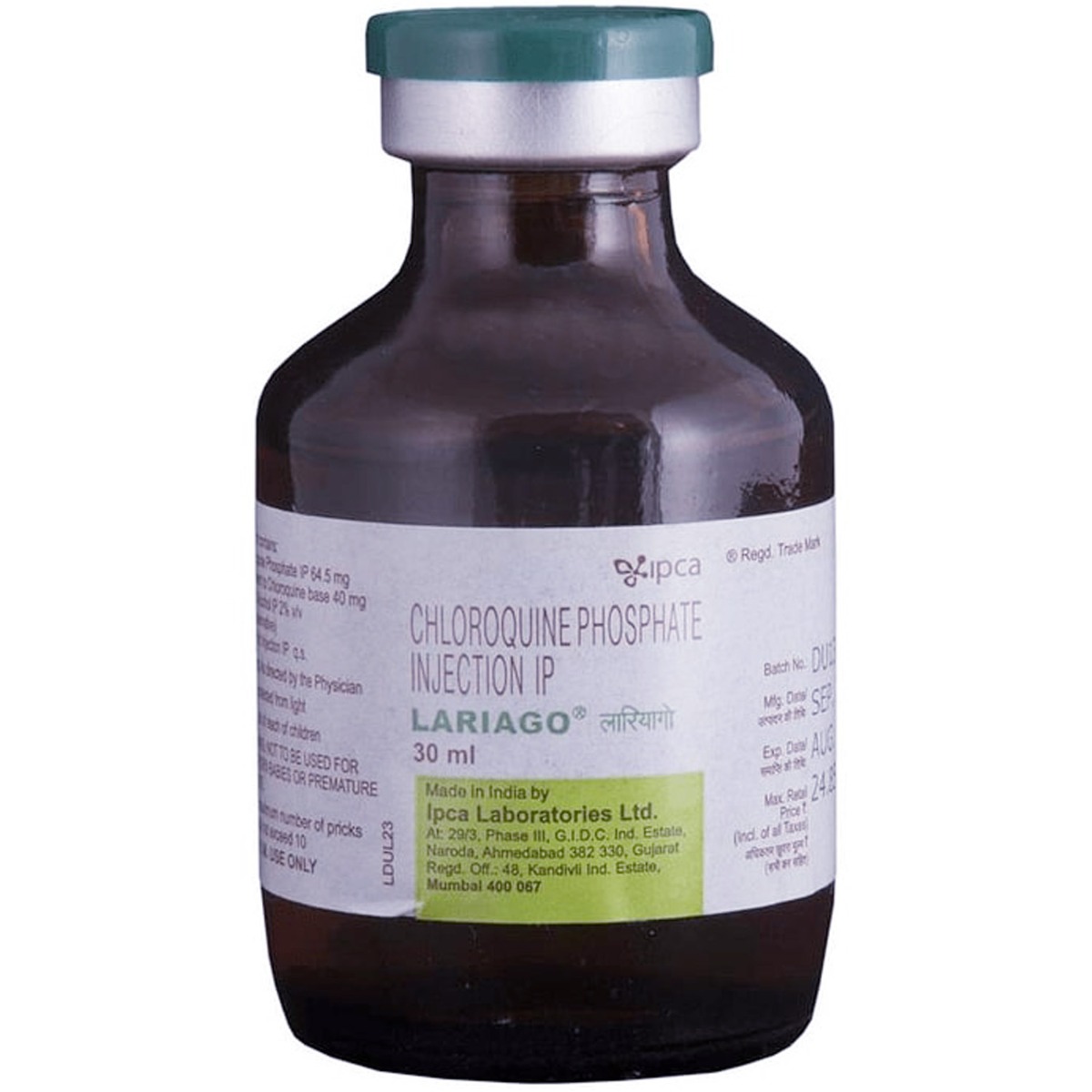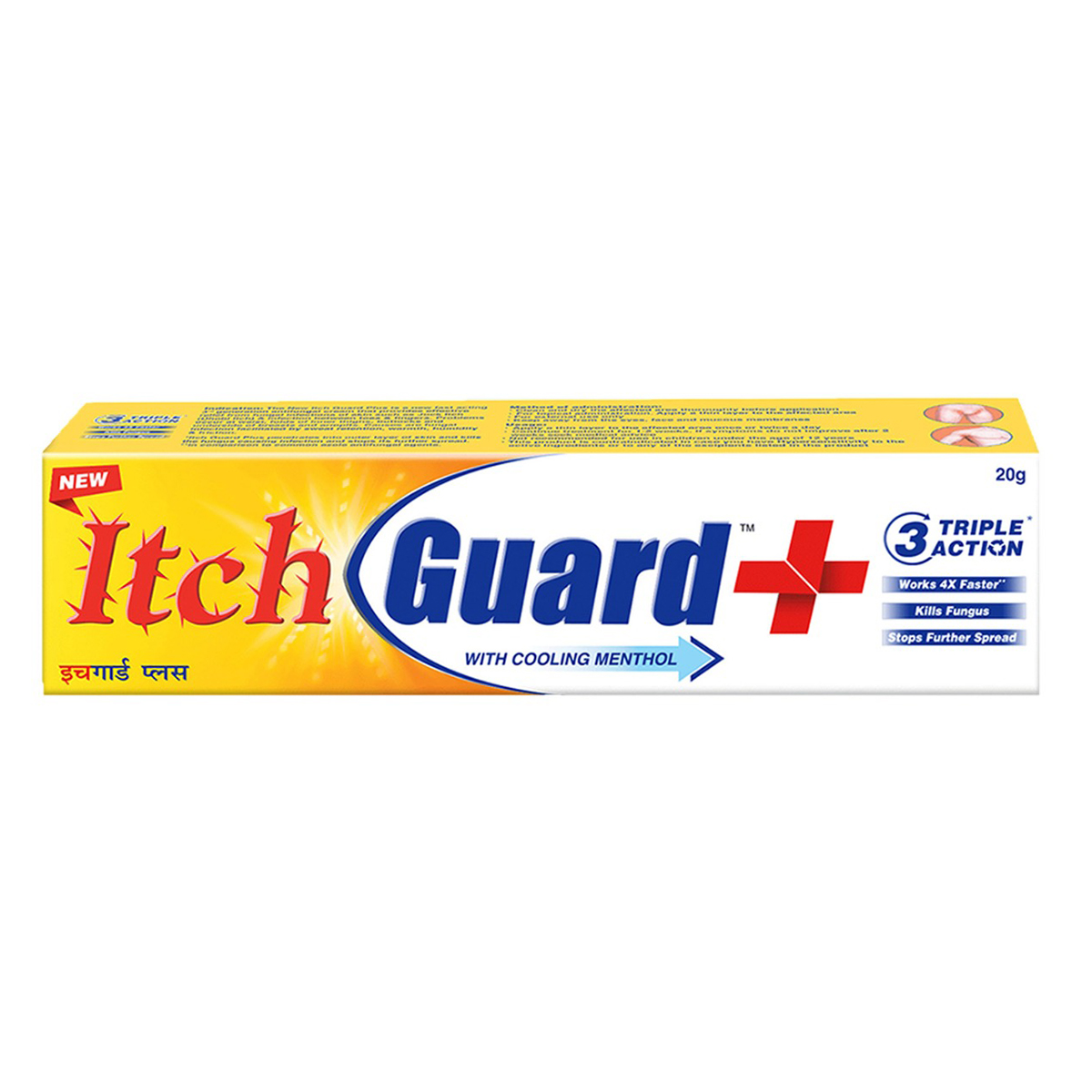Lariago Injection


MRP ₹52.5
(Inclusive of all Taxes)
₹7.9 Cashback (15%)
know your delivery time
Provide Delivery Location
Composition :
Manufacturer/Marketer :
Consume Type :
Expires on or after :
Return Policy :
Selected Pack Size:30
30 ₹47.3
(₹1.58 per unit)
In Stock
2 ml ₹5.4
(₹2.7 per ml)
In Stock
5 ml ₹13.5
(₹2.7 per ml)
In Stock

Secure Payment

Trusted by 8 Crore Indians

Genuine Products
Therapeutic Class
Country of origin
Manufacturer/Marketer address
Author Details
We provide you with authentic, trustworthy and relevant information
FAQs
Lariago Injection treats malaria by increasing the concentration of a toxic compound in the parasite that leads to its death.
Lariago Injection may cause irreversible retinal damage with long-term therapy. Retinopathy (disease related to the retina) is also reported with Chloroquine usage. You may not be advised Lariago Injection by your doctor if you have vision changes or retina damage. If the doctor has prescribed you this medicine knowing your medical history, you may be further advised to take ophthalmological examinations, including visual acuity, expert slit-lamp, funduscopic, and visual field tests. If there are any changes in these examinations, you may be asked to discontinue the treatment.
Inform your doctor in advance if you have any liver or kidney problems, heart diseases, diabetes, G-6-PD (glucose-6 phosphate dehydrogenase) deficiency (a genetic enzyme deficiency), electrolyte imbalance, psoriasis, alcoholism, porphyria (a blood disorder), hearing problems, vision-related issues, fits, and damaged retina or vision problems before starting Lariago Injection. Also, let your doctor know if you have recently undergone treatment with other anti-malarial drugs.
It is advised not to use Lariago Injection for the long term since it may produce retinal toxicity leading to blindness.
Disclaimer
Alcohol
Safe if prescribed
Avoid alcohol while using Lariago Injection since it can worsen your side effects.
Pregnancy
Consult your doctor
There is limited information on how Lariago Injection affects pregnancy. Please seek medical advice if you are pregnant or planning to conceive. Your doctor will prescribe Lariago Injection only if the benefits outweigh the risks.
Breast Feeding
Consult your doctor
Lariago Injection may be excreted into the breast milk when used during lactation. Please consult your doctor before starting Lariago Injection if you are a breastfeeding mother.
Driving
Safe if prescribed
Lariago Injection may make you feel dizzy or cause blurry vision. In such cases, do not drive or operate machinery until you are alert and have a clear vision.
Liver
Consult your doctor
Let your doctor know if you have any history of liver diseases before taking Lariago Injection.
Kidney
Consult your doctor
Let your doctor know if you have any history of kidney diseases before taking Lariago Injection.
Children
Safe if prescribed
Lariago Injection should be used for children only when prescribed by a doctor. Your doctor will decide the dose based on your child's age and body weight.
Product Substitutes
Reference
- https://www.drugs.com/mtm/chloroquine.html
- https://www.advacarepharma.com/en/antimalarials/chloroquine-phosphate-injection
- https://www.accessdata.fda.gov/drugsatfda_docs/label/2003/06002slr039_aralen_lbl.pdf
- http://www.antimicrobe.org/drugpopup/chloroquine.htm
- https://www.ncbi.nlm.nih.gov/books/NBK551512/
About Lariago Injection
Lariago Injection belongs to the class of 'anti-malarial drugs', primarily used to treat and prevent malaria. It may also be used to treat extraintestinal amebiasis/amoebiasis. Malaria is a disease caused by a plasmodium parasite transmitted by the bite of infected Anopheles mosquitoes. When an infected mosquito bites a healthy person, it transmits the 'Plasmodium parasite' into the bloodstream, which affects the red blood cells and liver cells. Extraintestinal amebiasis is a parasitic infection caused by Entamoeba histolytica that spreads to various organs, most commonly the liver.
Lariago Injection contains Chloroquine. It works by increasing the concentration of a toxic compound in the parasite that leads to its death. It is also amoebicidal in action and destroys the parasitic amoebas causing amoebiasis. Thereby treats malaria ans extraintestinal amebiasis.
Your doctor will decide the dose and duration based on your medical condition. Common side effects of Lariago Injection include nausea, vomiting, diarrhoea, stomach cramps, headache, hair loss, changes in mood/confusion, vision changes/blurred vision, black or tarry stools, bleeding gums, and dizziness. These side effects are not familiar to everyone and vary individually. If you notice any side effects that are not manageable, please consult your doctor.
Let your doctor know if you are allergic to any of the components in Lariago Injection. Inform your doctor if you have any liver or kidney problems, fits, heart diseases, hearing problems, vision-related issues, fits, and damaged retina or vision problems before starting Lariago Injection. It is essential to let your doctor know if you are pregnant, planning to conceive, or are a breastfeeding mother. Lariago Injection may cause dizziness; hence do not drive or operate machinery until you are alert. Avoiding alcohol during the treatment is recommended to rule out any possibility of worsening side effects. Lariago Injection should be used for children only when prescribed by a doctor.
Uses of Lariago Injection
Medicinal Benefits Mweb
Key Benefits
Lariago Injection contains Chloroquine. It works by increasing the concentration of a toxic compound in the parasite that leads to its death. It is effective against parasitic species, including Plasmodium vivax, Plasmodium malariae, and susceptible strains of Plasmodium falciparum. Lariago Injection is useful in extending the interval between treatment and relapse in patients with malaria or vivax malaria. It is also amoebicidal in action and destroys the parasitic amoebas causing amoebiasis. Chloroquine also has off-label uses in treating autoimmune diseases, such as rheumatoid arthritis and systemic lupus erythematosus.
Directions for Use
Side Effects of Lariago Injection
- Nausea
- Vomiting
- Diarrhoea
- Stomach cramps
- Headache
- Hair loss
- Changes in mood/confusion
- Vision changes/blurred vision
- Black or tarry stools
- Bleeding gums
- Dizziness
Drug Warnings
Before using Lariago Injection, inform your doctor if you have recently used any prescription and non-prescription medications, including other anti-malarial drugs. Inform your doctor if you have any allergic reactions, liver or kidney problems, heart diseases, diabetes, G-6-PD (glucose-6 phosphate dehydrogenase) deficiency, electrolyte imbalance, psoriasis, alcoholism, porphyria, hearing problems, vision-related issues, fits, and damaged retina or vision problems. Please seek medical advice if you are pregnant or breastfeeding before taking Lariago Injection. This medicine may cause dizziness; hence drive or operate machinery only when you are alert. Do not consume alcohol while being treated with Lariago Injection.
Drug-Drug Interactions
Drug-Drug Interactions
Login/Sign Up
Taking Lariago Injection 30 ml with Ziprasidone can increase the risk of irregular heart rhythm.
How to manage the interaction:
Taking Lariago Injection 30 ml with Ziprasidone is not recommended, it can be taken together if prescribed by a doctor. However, consult a doctor if you experience dizziness, drowsiness, confusion, and difficulty concentrating. Do not discontinue any medications without consulting a doctor.
When Lariago Injection 30 ml is taken with Dronedarone, it may increase the risk of abnormal heart rhythm.
How to manage the interaction:
Taking Lariago Injection 30 ml with Dronedarone is not recommended, as it can possibly result in an interaction, it can be taken if your doctor has advised it. However, if you experience sudden dizziness, lightheadedness, fainting, breathing difficulty, or rapid heartbeat, consult the doctor immediately. Do not discontinue any medications without consulting a doctor.
Taking Lariago Injection 30 ml with Cisapride can increase the risk of a serious abnormal heart rhythm.
How to manage the interaction:
Taking Lariago Injection 30 ml with Cisapride is not recommended as it can possibly result in an interaction, it can be taken if your doctor has advised it. However, if you experience sudden dizziness, lightheadedness, fainting, breathing difficulty, or rapid heartbeat, consult the doctor immediately.
When Agalsidase alfa is used with Lariago Injection 30 ml, it may decrease the effectiveness of the Agalsidase alfa.
How to manage the interaction:
Taking Agalsidase alfa with Lariago Injection 30 ml is not recommended, it can be taken together if prescribed by a doctor. However, if you experience any unusual symptoms, contact a doctor immediately. Do not stop using any medications without talking to a doctor.
Taking Lariago Injection 30 ml with Mesoridazine together can increase the chance of a serious abnormal heart rhythm.
How to manage the interaction:
Taking Lariago Injection 30 ml with Mesoridazine is not recommended, as it can possibly result in an interaction, it can be taken if your doctor has advised it. However, if you experience sudden dizziness, lightheadedness, fainting, breathing difficulty, or rapid heartbeat, consult the doctor immediately. Do not discontinue any medications without consulting a doctor.
Using Lariago Injection 30 ml together with bepridil can increase the risk of an irregular heart rhythm
How to manage the interaction:
Taking Lariago Injection 30 ml with Bepridil is not recommended, as it can possibly result in an interaction, it can be taken if your doctor has advised it. However, if you experience sudden dizziness, lightheadedness, fainting, breathing difficulty, or rapid heartbeat, consult the doctor immediately.
When Pimozide and Lariago Injection 30 ml are taken together, it can increase the chance of a serious abnormal heart rhythm.
How to manage the interaction:
Taking Lariago Injection 30 ml with Pimozide is not recommended, as it can possibly result in an interaction, it can be taken if your doctor has advised it. However, if you experience sudden dizziness, lightheadedness, fainting, breathing difficulty, or rapid heartbeat, consult the doctor immediately. Do not discontinue any medications without consulting a doctor.
Taking Auranofin with Lariago Injection 30 ml can increase the risk of blood disorders and other severe side effects
How to manage the interaction:
Taking Auranofin with Lariago Injection 30 ml is not recommended, as it may lead to an interaction, but it can be taken together if prescribed by a doctor. However, consult a doctor if you experience unusual symptoms. Do not discontinue any medications without consulting a doctor.
Taking pazopanib with Lariago Injection 30 ml can increase the risk of irregular heart rhythm.
How to manage the interaction:
Taking Pazopanib with Lariago Injection 30 ml is not recommended, but it can be taken together if prescribed by a doctor. However, consult your doctor if you experience sudden dizziness, lightheadedness, fainting, shortness of breath. Do not discontinue any medications without consulting a doctor.
Using Lariago Injection 30 ml together with telavancin can increase the risk of an irregular heart rhythm.
How to manage the interaction:
Taking Telavancin with Lariago Injection 30 ml is not recommended, as it can possibly result in an interaction, it can be taken if your doctor has advised it. However, if you experience sudden dizziness, lightheadedness, fainting, breathing difficulty, or rapid heartbeat, consult the doctor immediately. Do not discontinue any medications without consulting a doctor.
Drug-Food Interactions
Drug-Food Interactions
Login/Sign Up
Drug-Diseases Interactions
Drug-Diseases Interactions
Login/Sign Up
Porphyria: In porphyria the use of Lariago Injection 30 ml may aggravate this condition. Avoid Lariago Injection 30 ml use until it is required.
How to manage the interaction:
If the risks aren't expected to outweigh the possible advantages, Lariago Injection 30 ml shouldn't be utilized on these patients.
Arrhythmias:Lariago Injection 30 ml has adverse effect like prolongation of QT interval, ventricular arrhythmias and torsades de pointes. Monitor ECG before initiation and during the therapy.
How to manage the interaction:
If you have sudden dizziness, lightheadedness, fainting, shortness of breath, or rapid heartbeat while taking these medications, whether they are taken together or separately, you should seek immediate assistance from a doctor. A close monitoring of ECG is required.
Seizures: Lariago Injection 30 ml may cause epileptic seizures in susceptible patients. Administer Lariago Injection 30 ml in patients with history of epilepsy.
How to manage the interaction:
In those who are vulnerable, Lariago Injection 30 ml may result in epileptic fits. Patients who already have epileptic fits or have a low tolerance for seizures may be at greater risk.
Bone marrow suppression: With the use of Lariago Injection 30 ml adverse effects such as neutropenia, agranulocytosis, aplastic anemia, and thrombocytopenia. In patients with preexisting bone marrow suppression use cautiously and monitor for complete blood count. Discontinue the Lariago Injection 30 ml if any serious blood disorder is suspected.
How to manage the interaction:
It is important to inform your doctor if you have prior conditions like bone marrow suppression, a complete blood picture is advised to be taken if you are on a long term therapy with Lariago Injection 30 ml. If you suspect any blood disorders, please inform it to your doctor immediately.
Ototoxicity: Rarely, Lariago Injection 30 ml was been associated with ototoxicity.The use of Lariago Injection 30 ml has been associated rarely with ototoxicity. With long-term, high-dose Lariago Injection 30 ml therapy which is irreversible nerve-type deafness may occur. In some patients with preexisting auditory damage, tinnitus, decrease in hearing may occur. Use with caution and discontinue therapy if new auditory defects occur or if hearing loss becomes worse.
How to manage the interaction:
If you any existing hearing damage, do not forget to inform it your doctor, so that a close monitoring can be done during the treatment with Lariago Injection 30 ml.
In psoriasis patients, the Lariago Injection 30 ml use may exacerbate severe attack of psoriasis. Do not use Lariago Injection 30 ml unless the potential benefits vs risks outweighs.
How to manage the interaction:
It is important to tell your doctor if you have any existing skin conditions like psoriasis. Your doctor may prescribe the medication, if the benefits are more than the risks.
myasthenia gravis Use of Lariago Injection 30 ml may exacerbate new onset of symptoms in patients with previously diagnosed myasthenia gravis. Use cautiously.
How to manage the interaction:
If you are suffering from myasthenia gravis, do not forget to tell it to your doctor. If you are taking Lariago Injection 30 ml and experiencing symptoms like muscle weakness or weakness of the arms and legs, drooping of upper eyelid, difficulty speaking, difficulty swallowing, double vision, tiredness, or shortness of breath please inform your doctor.
Drug-Drug Interactions Checker List
- CIMETIDINE
- AMPICILLIN
- CYCLOSPORIN
- KAOLIN
Habit Forming
Special Advise
Let your doctor/laboratory staff know that you are taking Lariago Injection if you are undergoing any medical tests.
Diet & Lifestyle Advise
Malaria:
- Take nutritious food, including fresh fruits and vegetables, to help recover from malarial fever.
- During malarial fever, the patient may experience appetite loss. In such cases, drink glucose water, fresh fruit juices, and coconut water.
- Include high-fibre foods like green leafy vegetables and fruits to aid digestion.
- Take proper rest to help your body relax and heal faster.
- Avoid or limit the intake of alcohol and caffeine.
Extra intestinal Amebiasis:
- Include fruits, vegetables, whole-grain bread, low-fat dairy products, beans, lean meats, and fish in your diet.
- Avoid alcohol consumption that can further damage your liver in liver abscess.
- Wash your hands often to prevent infection.
- Stay away from patients who are infected with amebiasis.
All Substitutes & Brand Comparisons
RX
Out of StockMalswift 40mg Injection
Ind Swift Laboratories Ltd
₹10
(₹0.3/ 1ml)
81% CHEAPERRX
Out of StockNeoquine 40mg Injection
Neon Laboratories Ltd
₹12.94
(₹0.39/ 1ml)
75% CHEAPERRX
Out of StockBitaquine 40mg Injection
Bombay Tablet Mfg Co Pvt Ltd
₹13.94
(₹0.42/ 1ml)
73% CHEAPER

Have a query?
Buy best Infections & Infestation products by
Cipla Ltd
Macleods Pharmaceuticals Ltd
Alkem Laboratories Ltd
Lupin Ltd
Abbott India Ltd
Sun Pharmaceutical Industries Ltd
Mankind Pharma Pvt Ltd
Micro Labs Ltd
Aristo Pharmaceuticals Pvt Ltd
FDC Ltd
Intas Pharmaceuticals Ltd
Glenmark Pharmaceuticals Ltd
Ipca Laboratories Ltd
Torrent Pharmaceuticals Ltd
Zydus Healthcare Ltd
Biochem Pharmaceutical Industries Ltd
Zuventus Healthcare Ltd
United Biotech Pvt Ltd
Hetero Drugs Ltd
Emcure Pharmaceuticals Ltd
Alembic Pharmaceuticals Ltd
Indoco Remedies Ltd
Fusion Health Care Pvt Ltd
Dr Reddy's Laboratories Ltd
Leeford Healthcare Ltd
Cadila Healthcare Ltd
Wockhardt Ltd
Zydus Cadila
GlaxoSmithKline Pharmaceuticals Ltd
Morepen Laboratories Ltd
Blue Cross Laboratories Pvt Ltd
Cadila Pharmaceuticals Ltd
Converge Biotech Pvt Ltd
Elder Pharmaceuticals Ltd
Hetero Healthcare Pvt Ltd
Pfizer Ltd
AAA Pharma Trade Pvt Ltd
Gufic Bioscience Ltd
Mylan Pharmaceuticals Pvt Ltd
Corona Remedies Pvt Ltd
Wallace Pharmaceuticals Pvt Ltd
Apex Laboratories Pvt Ltd
Medishri Healthcare Pvt Ltd
Akumentis Healthcare Ltd
Alniche Life Sciences Pvt Ltd
Hegde & Hegde Pharmaceutica Llp
Veritaz Healthcare Ltd
Ranbaxy Laboratories Ltd
Koye Pharmaceuticals Pvt Ltd
Shreya Life Sciences Pvt Ltd
Overseas Health Care Pvt Ltd
Biocon Ltd
Indchemie Health Specialities Pvt Ltd
Medley Pharmaceuticals Ltd
Brinton Pharmaceuticals Ltd
J B Chemicals & Pharmaceuticals Ltd
Unifaith Biotech Pvt Ltd
Ajanta Pharma Ltd
Biochemix Health Care Pvt Ltd
Natco Pharma Ltd
Samarth Life Sciences Pvt Ltd
Unichem International
Laborate Pharmaceuticals India Ltd
Unipark Biotech Pvt Ltd
Zymes Bioscience Pvt Ltd
Indiabulls Pharmaceuticals Pvt Ltd
Neon Laboratories Ltd
Vasu Organics Pvt Ltd
DR Johns Lab Pharma Pvt Ltd
East West Pharma India Pvt Ltd
La Renon Healthcare Pvt Ltd
Medgen Drugs And Laboratories Pvt Ltd
Novartis India Ltd
Canixa Life Sciences Pvt Ltd
Icarus Health Care Pvt Ltd
Lincoln Pharmaceuticals Ltd
Celon Laboratories Pvt Ltd
Concept Pharmaceuticals Ltd
Klm Laboratories Pvt Ltd
Nicholas Piramal India Ltd
Systopic Laboratories Pvt Ltd
Yuventis Pharmaceuticals
Capital Pharma
German Remedies Ltd
Pristine Pearl Pharma Pvt Ltd
Unison Pharmaceuticals Pvt Ltd
Aurz Pharmaceutical Pvt Ltd
Clover Health Care Pharma
Kepler Healthcare Pvt Ltd
Allites Life Sciences Pvt Ltd
Auspharma Pvt Ltd
Intra Life Pvt Ltd
Jolly Healthcare
Linux Laboratories Pvt Ltd
Ozone Pharmaceuticals Ltd
Cachet Pharmaceuticals Pvt Ltd
Comed Chemicals Ltd
Delcure Life Sciences Ltd
Fresenius Kabi India Pvt Ltd
Khandelwal Laboratories Pvt Ltd
Frequently Bought Together
₹101.1
MRP ₹121.5
17% off
1
+








